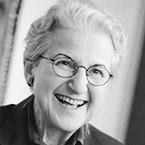
Beatrice Mintz, PhD, a Fellow of the AACR Academy and a trailblazing pioneer in multiple fields of cancer biology, died January 3, 2022, at the age of 100.
Born January 24, 1921, in New York, New York, Mintz graduated magna cum laude from Hunter College and earned a master’s degree in 1944 and a doctorate in 1946 from the University of Iowa. Mintz received a Fulbright research fellowship at the Universities of Paris and Strasbourg in 1951.
Mintz was a professor of biological science at the University of Chicago from 1946 to 1960, when she moved to the Institute for Cancer Research (ICR) of the Lankenau Hospital Research Institute. She worked at ICR until 1974, when it became a separate entity and was renamed Fox Chase Cancer Center. Mintz remained at Fox Chase for the rest of her career, where she held several positions including the Jack Schultz Chair in Basic Science from 2002 to 2019. She also served as an adjunct professor at the University of Pennsylvania.
During her distinguished career, Mintz made unprecedented discoveries in several different aspects of biology, including developmental genetics, gene-transfer technology, embryology, epigenetics, and the tumor microenvironment. She was the first to propose that chimeric mice could be constructed in a manner that would allow for two genetically distinct cell populations to coexist throughout life. In such animals, specific cell lineages became detectable, which led Mintz to ascertain that development involves an expanding succession of progressively restricted stem cells that are able to proliferate clonally and subsequently differentiate into desired cell types. This led her to postulate that cancer represents an aberration of development in which proper cellular homeostasis is modified in favor of proliferation that may be further exacerbated by genetic insults. Mintz next demonstrated that transgenic mice could be engineered by modifying genes in utero, which allowed for mouse models of specific cancers to be purposely developed for future research.
Mintz also demonstrated the importance of the local cellular environment in governing cellular behavior, especially stem cells. In a groundbreaking experiment, she showed that early carcinoma stem cells could be stably normalized if transferred to a normal cellular environment appropriate for their developmental stage. Her research findings and breakthroughs have since been leveraged by countless cancer researchers to establish specific mouse models of cancer. Her model of cutaneous melanoma, in particular, became a widely used research tool.
Mintz was appointed to the President’s Biomedical Research Panel (Development Biology Group) in 1975. Among many other career awards, she was honored with the New York Academy of Sciences Award in Biological and Medical Sciences in 1979; the Lewis S. Rosenstiel Award in Basic Medical Research from Brandeis University in 1980; the National Medal of Honor for Basic Research from the American Cancer Society in 1997; the Pearl Meister Greengard Prize from Rockefeller University in 2008; and the Albert Szent-Györgyi Prize for Progress in Cancer Research in 2011. She was the first recipient of several prestigious awards, including the Genetics Society of America Medal in 1981, the Ernst Jung Gold Medal for Medicine in 1990, and the March of Dimes Prize in Developmental Biology in 1996. She was a Fellow of the American Academy of Arts and Sciences and the American Association for the Advancement of Science and was an elected member of the National Academy of Sciences.
In 2012, Mintz received the AACR Award for Lifetime Achievement in Cancer Research, and in 2013, she was elected to the inaugural class of Fellows of the AACR Academy. Among other AACR activities, Mintz served as an associate editor of Cancer Research from 1993-2000 and was a member of Women in Cancer Research from 2014 to 2021.
“Dr. Mintz was a brilliant scientist whose trailblazing work established clonal regulation as one of cancer’s fundamental units of development,” said Margaret Foti, PhD, MD (hc), chief executive officer of the AACR. “She made foundational discoveries and revolutionized many tools and techniques of molecular biology that paved the way for tremendous progress in our understanding of cancer.”
Leave your remembrance of Dr. Mintz below.
Dr. Mintz was an extraordinary scientist, a generous and constantly supportive teacher and a wonderful human being. Her encouragement and counsel in my early efforts in transplantation were a great aid to me.